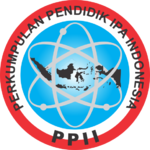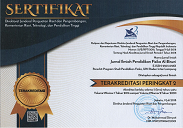Scientific Literacy: How is it Evolved to Pre-Service Physics Teacher?
Abstract
Scientific literacy is the ability to use scientific knowledge, identify problems, and draw conclusions based on evidence, in order to understand and make decisions about nature and changes that occur in nature as a result of human activity. This study aims to determine the development of physics teacher candidates’ scientific literacy. This is important to prepare the physics teachers in the future. The method used was ex-post facto. The subjects of this research were all students of physics education Department of UIN Sunan Gunung Djati Bandung from the first to the last semester. The data collection used was essayed tests which contained the context of science, the content of science, the process of science, and the attitude of science. Data analysis was done qualitatively and quantitatively. Based on the results of this study, it indicates that the scientific literacy ability possessed by physics teacher candidate students experiencing a continuous development in terms of the context of science, science content, the process of science, and attitude to science. The result of this research may be applied by the Physics Department to make a decision or rule on how to improve the physics student’ literacy level
Keywords
Full Text:
PDFReferences
Arohman, M., Safudin, & Priyandoko, D. (2016). Kemampuan Literasi Sains Siswa pada Pembelajaran Ekosistem. In Prosiding Seminar Biologi (pp. 90–92).
Asyhari, A., & Asyhari, A. (2017). Literasi Sains Berbasis Nilai-Nilai Islam dan Budaya Indonesia. Jurnal Ilmiah Pendidikan Fisika Al-Biruni, 6(1), 137. https://doi.org/10.24042/jpifalbiruni.v6i1.1584
August, D., & Shanahan, T. (2017). Developing literacy in second-language learners: Report of the National Literacy Panel on Language-Minority Children and Youth. Rouledge.
Bovill, C., Cook-Sather, A., Felten, P., Millard, L., & Moore-Cherry, N. (2016). Addressing potential challenges in co-creating learning and teaching: overcoming resistance, navigating institutional norms and ensuring inclusivity in student–staff partnerships. Higher Education, 71(2), 195–208. https://doi.org/10.1007/s10734-015-9896-4
Chang, C. Y., Chang, Y. H., & Yang, F. Y. (2009). Exploring Secondary Science Teachers’ Perceptions on the Goals of Earth Science Education in Taiwan. International Journal of Science Education, 31(17), 2316.
Chang, S. N., & Chiu, M. H. (2005). The Development of Authentic Assessments to Investigate ninth Graders’ Scientific Literacy: In The Case of Scientific Cognition Concerning The Concepts of Chemistry and Physics. International Journal of Science and Mathematics Education, 3.
Chatfield, C. (2018). Introduction to Multivariate Analysis. Routledge. https://doi.org/10.1201/9780203749999
Connor, C. M., Dombek, J., Crowe, E. C., Spencer, M., Tighe, E. L., Coffinger, S., … Petscher, Y. (2017). Acquiring science and social studies knowledge in kindergarten through fourth grade: Conceptualization, design, implementation, and efficacy testing of content-area literacy instruction (CALI). Journal of Educational Psychology, 109(3), 301–320. https://doi.org/10.1037/edu0000128
Crowder, M. (2017). Statistical Analyse of Reliability Data. Routledge.
Dong, Y., Chai, C. S., Sang, G.-Y., Koh, J. H. L., & Tsai, C.-C. (2015). Exploring the Profiles and Interplays of Pre-service and In-service Teachers’ Technological Pedagogical Content Knowledge (TPACK) in China. Journal of Educational Technology & Society. International Forum of Educational Technology & Society. https://doi.org/10.2307/jeductechsoci.18.1.158
Drew, S. V., & Thomas, J. (2018). Secondary science teachers’ implementation of CCSS and NGSS literacy practices: a survey study. Reading and Writing, 31(2), 267–291. https://doi.org/10.1007/s11145-017-9784-7
Islami, R. A. Z. El, Nahadi, N., & Permanasari, A. (2016). Membangun Literasi Sains Siswa Pada Konsep Asam Basa Melalui Pembelajaran Inkuiri Terbimbing. Jurnal Penelitian Dan Pembelajaran IPA, 2(2), 110–120. https://doi.org/10.30870/JPPI.V2I2.662
Iswadi, H. (2016). Sekelumat dari Hasil PISA 2015 yang Baru Dirilis.
Johnson-Glenberg, M. C., Megowan-Romanowicz, C., Birchfield, D. A., & Savio-Ramos, C. (2016). Effects of Embodied Learning and Digital Platform on the Retention of Physics Content: Centripetal Force. Frontiers in Psychology, 7, 1819. https://doi.org/10.3389/fpsyg.2016.01819
Linder, A., Airey, J., Mayaba, N., & Webb, P. (2014). Fostering Disciplinary Literacy? South African Physics Lecturers’ Educational Responses to their Students’ Lack of Representational Competence. African Journal of Research in Mathematics, Science and Technology Education, 18(3), 242–252. https://doi.org/10.1080/10288457.2014.953294
Luke, A. (2018). The social construction of literacy in the primary school. In Critical Literacy, Schooling and Social Justice (1st ed., pp. 28–74). New York: Routledge.
Orr, A. M., & Kukner, J. M. (2015). Fostering a creativity mindset in content area pre-service teachers through their use of literacy strategies. Thinking Skills and Creativity, 16, 69–79. https://doi.org/10.1016/J.TSC.2015.02.003
Proyowidodo, G., & Luik, J. (2014). Communicating disaster mitigation literacy to coastal communities in Pacitan, Indonesia. American International Journal of Research in Humanities, Arts and Social Sciences, 5(2), 245–248.
Rainey, E. C., Maher, B. L., Coupland, D., Franchi, R., & Moje, E. B. (2018). But What Does It Look Like? Illustrations of Disciplinary Literacy Teaching in Two Content Areas. Journal of Adolescent & Adult Literacy, 61(4), 371–379. https://doi.org/10.1002/jaal.669
Restivo, S. (2017). The Social Construction of Mathematics. In Sociology, Science, and the End of Philosophy (pp. 253–281). London: Palgrave Macmillan UK. https://doi.org/10.1057/978-1-349-95160-4_7
Roos, J. M. (2014). Measuring science or religion? A measurement analysis of the National Science Foundation sponsored science literacy scale 2006–2010. Public Understanding of Science, 23(7), 797–813. https://doi.org/10.1177/0963662512464318
Soobard, R., & Rannikmae, M. (2011). Assesing student’s levels of scientific literacy using interdisiplinary scenarios. Science Education International, 22(2), 133–144.
Supeno, S., Subiki, S., & Rohma, L. W. (2018). Students’ Ability In Solving Physics Problems on Newtons’ Law of Motion. Jurnal Ilmiah Pendidikan Fisika Al-Biruni, 7(1), 59–70. https://doi.org/10.24042/jipfalbiruni.v7i1.2247
Towns, E., & Ashby, S. (2014). The influence of practice educators on occupational therapy students ’ understanding of the practical applications of theoretical knowledge : A phenomenological study into student experiences of practice education. Australian Occupational Therapy Journal, 61(April), 344–352. https://doi.org/10.1111/1440-1630.12134
Vieira, R. M., & Tenreiro-Vieira, C. (2016). Fostering Scientific Literacy and Critical Thinking in Elementary Science Education. International Journal of Science and Mathematics Education, 14(4), 659–680. https://doi.org/10.1007/s10763-014-9605-2
Wallace, C. S. (2004). Framing New Research in Science Literacy and Language Use: Authenticity, Multiple Discourses, and the "Third Space. In Framing New Research in Science Literacy and Language Use: Authenticity, Multiple Discourses, and the "Third Space (p. 902).
Wright, K. L., Franks, A. D., Kuo, L.-J., McTigue, E. M., & Serrano, J. (2016). Both Theory and Practice: Science Literacy Instruction and Theories of Reading. International Journal of Science and Mathematics Education, 14(7), 1275–1292. https://doi.org/10.1007/s10763-015-9661-2
Zakwandi, R., Rochman, C., Nasrudin, D., Yuningsih, E. K., & Putra, S. (2018). Profil Literasi Fisika Siswa Madrasah Terhadap Mitigasi Bencana Erosi Batang Sinamar. Jurnal Pendidikan Islam Belajea, 3(1), 47–58. https://doi.org/http://dx.doi.org/10.29240/bjpi.v3i1.279
DOI: http://dx.doi.org/10.24042/jipfalbiruni.v7i2.2781
Refbacks
- There are currently no refbacks.

Jurnal ilmiah pendidikan fisika Al-Biruni is licensed under a Creative Commons Attribution-ShareAlike 4.0 International License.
![]()







